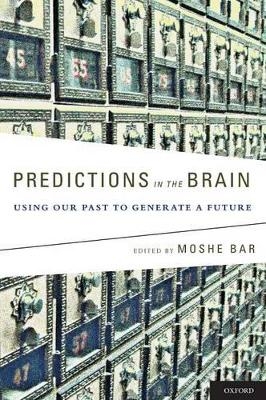
Predictions in the Brain
Oxford University Press Inc (Verlag)
978-0-19-539551-8 (ISBN)
When one is immersed in the fascinating world of neuroscience findings, the brain might start to seem like a collection of "modules," each specializes in a specific mental feat. But just like in other domains of Nature, it is possible that much of the brain and mind's operation can be explained with a small set of universal principles. Given exciting recent developments in theory, empirical findings and computational studies, it seems that the generation of predictions might be one strong candidate for such a universal principle. This is the focus of Predictions in the brain. From the predictions required when a rat navigates a maze to food-caching in scrub-jays; from predictions essential in decision-making to social interactions; from predictions in the retina to the prefrontal cortex; and from predictions in early development to foresight in non-humans.
The perspectives represented in this collection span a spectrum from the cellular underpinnings to the computational principles underlying future-related mental processes, and from systems neuroscience to cognition and emotion. In spite of this diversity, they share some core elements. Memory, for instance, is critical in any framework that explains predictions. In asking "what is next? " our brains have to refer to memory and experience on the way to simulating our mental future.
But as much as this collection offers answers to important questions, it raises and emphasizes outstanding ones. How are experiences coded optimally to afford using them for predictions? How do we construct a new simulation from separate memories? How specific in detail are future-oriented thoughts, and when do they rely on imagery, concepts or language? Therefore, in addition to presenting the state-of-the-art of research and ideas about predictions as a universal principle in mind and brain, it is hoped that this collection will stimulate important new research into the foundations of our mental lives.
Moshe Bar, Ph.D, is the Director of the Cognitive Neuroscience Laboratory at the Harvard Medical School and the Massachusetts General Hospital. He has been using methods from cognitive psychology, psychophysics, computational neuroscience, psychiatry and human brain imaging to explore issues concerning human vision, context and predictions.
(Preface) Predictions: A universal principle in the operation of the human brain
Moshe Bar
1. Varieties of Future Experience
Karl K. Szpunar , and Endel Tulving
2. The proactive brain
Moshe Bar
3. Simulation, Situated Conceptualization, and Predictions
Lawrence W. Barsalou
4. The Prefrontal Cortex and the Construction of Mental Models for Future Thinking
Aron K. Barbey, Frank Krueger, and Jordan Grafman
.
5. On the nature of medial temporal lobe contributions to the constructive simulation of future events
Daniel Schacter and Donna Rose Addis
6. The construction system of the brain
Demis Hassabis and Eleanor A. Maguire
7. Similarities in Episodic Future Thought and Remembering: The Importance of Contextual Setting
Kathleen McDermott, Karl K. Szpunar , and Kathleen M. Arnold
8. Imagining Predictions: Mental Imagery as Mental Emulation
Samuel T. Moulton and Stephen M. Kosslyn
9. See It with Feeling: Affective Predictions During Object Perceptionsp
Lisa Feldman Barrett and Moshe Bar
10. The somatic marker hypothesis and its neural basis: Using past experiences to forecast the future in decision-making
Antoine Bechara
11. Envisioning the Future and Self-Regulation
Shelley E. Taylor
12. Prediction: A Construal Level Theory Perspective
Nira Liberman, Yaacov Trope, and So Yon Rim
13. Previews, Premotions, and Predictions
Daniel Gilbert and Timothy D. Wilson
14. On look-ahead in language: navigating a multitude of familiar paths
Shimon Edelman
15. A look around at what's ahead: Prediction and predictability in language processing
Marta Kutas, Katherine A. DeLong, and Nathaniel J. Smith
16. Cortical and Subcortical Predictive Dynamics and Learning during Perception, Cognition, Emotion, and Action
Stephen Grossberg
17. Predictive coding: A free-energy formulation
Karl Friston and Stefan Kiebel
18. Sequence Memory for Prediction, Inference, and Behavior
Jeff Hawkins, Dileep George, and Jamie Niemasik
19. Prediction, sequences and the hippocampus
John Lisman and A. David Redish
20. The neurobiology of memory based predictions
Howard Eichenbaum and Norbert J. Fortin
21. Predicting not to predict too much: How the cellular machinery of memory anticipates the uncertain future
Yadin Dudai
22. The Retina As Embodying Predictions About the Visual World
Michael J. Berry II and Gregory Schwartz
23. Making Predictions: A Developmental Perspective
Cristina Atance and Laura K. Hanson
24. Prospective Decision Making in Animals: A Potential Role for Intertemporal Choice in the study of Prospective Cognition
Lucy G Cheke, James M Thom and Nicola S Clayton
25. Mental Time Travel and the Shaping of the Human Mind
Thomas Suddendorf
| Erscheint lt. Verlag | 9.6.2011 |
|---|---|
| Verlagsort | New York |
| Sprache | englisch |
| Maße | 257 x 183 mm |
| Gewicht | 1157 g |
| Themenwelt | Geisteswissenschaften ► Psychologie ► Allgemeine Psychologie |
| Geisteswissenschaften ► Psychologie ► Verhaltenstherapie | |
| ISBN-10 | 0-19-539551-4 / 0195395514 |
| ISBN-13 | 978-0-19-539551-8 / 9780195395518 |
| Zustand | Neuware |
| Informationen gemäß Produktsicherheitsverordnung (GPSR) | |
| Haben Sie eine Frage zum Produkt? |
aus dem Bereich


